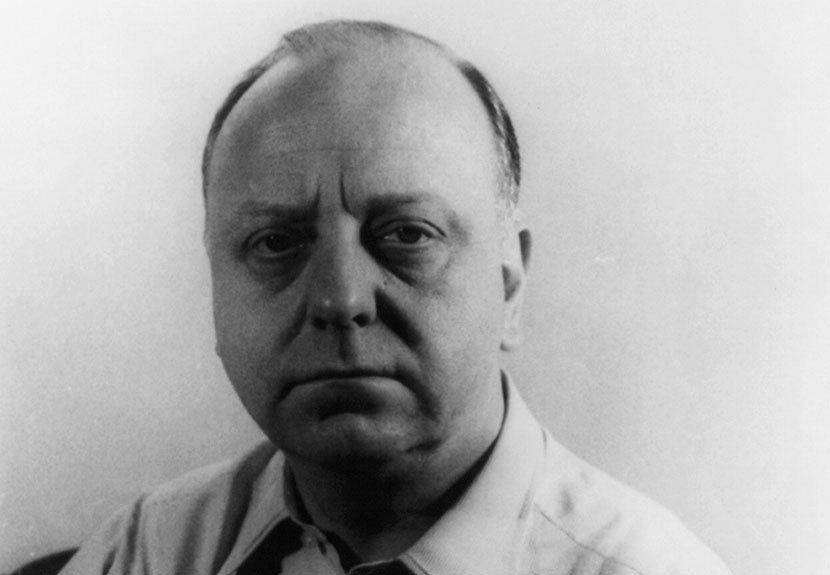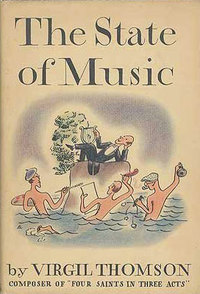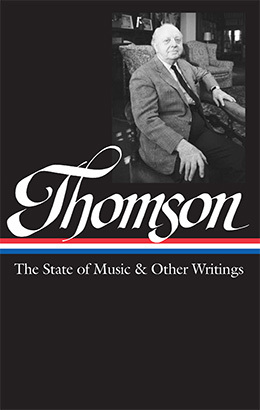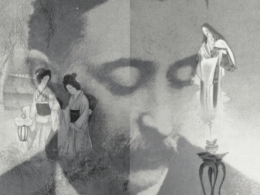Library of America completes its Virgil Thomson edition this summer with the publication of The State of Music and Other Writings, which includes his first book, 1939’s The State of Music, his best-selling 1966 autobiography Virgil Thomson, and two other full-length works along with a selection of previously uncollected essays and reviews.
Taken cumulatively, the new book ranges authoritatively over an extraordinary swath of twentieth-century music, from the post-World War I Paris of Satie and Les Six to New York City’s 1970s jazz scene.
We spoke with Tim Page, who edited this book and LOA’s first Thomson volume, Music Chronicles 1940–1954, about the incorrigible composer-critic. A professor of journalism and music at the University of Southern California, Page won the Pulitzer Prize for criticism in 1997 for his Washington Post music reviews, and is also the author, editor, or co-editor of more than twenty books.

LOA: Whereas Music Chronicles 1940–1954 brought together Thomson’s newspaper reviews, The State of Music and Other Writings collects four book-length works and a selection of longer essays from the latter part of his career. How is the writing different in these more extended works—is Thomson motivated by a different set of concerns than in his daily reviewing, for instance?
Page: I’d say that the most obvious difference between the collected books and pieces in this volume and Thomson’s daily journalism is the simple fact that the author here had time to work as long as he wanted to on his writing. Back in the mid-twentieth century, a newspaper review might have to be written in an hour, sometimes even less, and each paragraph would have to be fed to the printer immediately, so that it could be typeset. A nightmare for any fastidious writer! The writings here were composed with more leisure—although Thomson’s snappy wit remained intact.
LOA: Many of the liveliest passages in the first book, The State of Music (1939), are his salvos directed at what he dubbed “the Appreciation-racket,” with its promotion of a narrow standardized repertory, and where music “is neither taught nor defined. It is preached.” What was the reaction in cultural circles in 1939—and were these broadsides still relevant when the book was reissued, in 1962?

Page: Virgil was what they used to call a “bomb thrower”—he liked to cause a little trouble when he could. I think his views were popular with many musicians and intellectuals but never found much favor among the corporate sultans of the “music business.” A great deal of the sponsored musical education of the time was promoted by record companies and radio stations to sell product, and to “brand” certain artists as inseparable from the music they played (Toscanini/Beethoven is likely the most famous example). Thomson thought that this was less education than sheer personal publicity and he said so, bluntly and wittily, again and again.
He was also opposed to the corporate tendency to treat classical music as though it was written only by dead people and was no longer a thriving and venturesome art. His comments remain relevant to this day: indeed, matters have only worsened.
LOA: The early chapters of Thomson’s autobiography make it clear just how fundamental music-making was to the Thomson household as he was growing up. (He played the piano and several members of his extended family sang or accompanied on violin.) Can we speculate as to how that formative experience shaped his critical sensibility?
Page: In the days before radio and recording, if you didn’t live in a major metropolis, making music at home was about the only way you’d get to hear it. Many, perhaps most, American families had pianos. If not, they could be found abundantly in educational facilities, houses of worship, taverns, and many other places. At one time, the city of Baltimore alone had three piano companies. And so people played reductions of Beethoven symphonies at home, and sang to themselves or their friends and family, and took up other instruments or joined choruses. It was very definitely a “do-it-yourself” way to learn the art, and Virgil was actively involved with it from earliest childhood. As such, he learned how music actually worked and was always frustrated with the hazy romantic jargon in which it was surrounded.
LOA: In the chapter on Aaron Copland in American Music Since 1910, Thomson isn’t shy about citing himself as an important influence on Copland’s work. Do his claims hold up to objective scrutiny, decades later—or might there be some professional rivalry/jealousy in evidence here?
Page: Nobody but Virgil ever thought he was a significant influence on Copland.
LOA: A reader in 2016 might note with frustration that some of the fellow American composers Thomson champions most eloquently in these pages, Carl Ruggles and Lou Harrison in particular, still seem stuck on the margins of the standard repertory. What would Thomson have had to say about that, if he were still with us today?
Page: American composers are almost all still on the margins! So much wonderful American music is yet to be discovered—or, to put it perhaps more exactly, reclaimed. (It should be remembered that when the modernist composers Wallingford Riegger and Roger Sessions died, they both received long and respectful obituaries on the front page of The New York Times. Who plays their work today?)
The only recent American composer I can think of who is likely better known now than when he died would be Morton Feldman, whose long, quiet, and meditative works are now able to occupy the world apart from an angry and obstreperous personality that did nothing to encourage advocacy. But such revivals are very rare.
LOA: One highlight of LOA’s first Thomson volume was an enjoyably scandalous 1953 critique of Mahler’s Second Symphony that he understandably never reprinted in his lifetime. Can readers look forward to anything equally provocative in the new book?
Page: The State of Music will always remain a bracing shock. To make generalizations about groups of people is always a risky endeavor—more so now than ever—and Virgil all but lived to generalize. Careless or easily affronted readers can always find some sort of “prejudice” in his writing but, if so, he was pretty “equal opportunity” in his commentary and usually without malice. (“Dancers are auto-erotic and have no conversation” is one of his more memorable lines.)
The whole book is both acute and hilarious. That said, I am glad that we are republishing The State of Music because I don’t think it would find a first publisher now.




